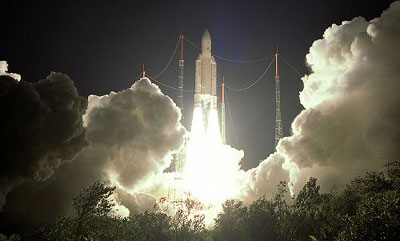EADS, Clearstream, and the future of France’s space industryby Taylor Dinerman
|
| For the space industry this means that two of Europe’s most important satellite and launch vehicle manufacturers are now caught up in an ugly political scandal. |
It a nutshell the Clearstream scandal involves a fake list of high-up people involved in French politics and industry who supposedly held illegal accounts at Clearstream, a bank in Luxembourg. The accusation was that these funds were kickbacks from, among other things, the sale of frigates to Taiwan. This dirty trick was intended to destroy the political career of France’s current interior minister, Nicholas Sarkozy. It is strongly suspected that the operations was carried out on behalf of the prime minister, Dominique de Villepin, Sarkozy’s rival, and possibly the French president, Jacques Chirac.
The man at the heart of the scandal is Jean-Louis Gergorin, who earlier this month quit as “Head of Strategic Coordination” at the European aerospace giant. Since then he has been definitively fired. The company naturally claims that Clearstream has nothing to do with EADS. However, the fact is that France’s defense industry is far more intimately involved with the government than in almost any other of the advanced democracies. Gergorin’s career has taken him from the best French universities to the Rand corporation in the US and then to the French Foreign Ministry where, in 1973 under Michel Jobert, he set up a Center for Analysis and Prediction.
Later, he became involved in a nasty fight between Thompson, which is now part of Thales, and Lagardere/ Matra, now part of EADS. Thompson was involved in a nasty scandal over the Taiwanese frigates. At one time he even claimed that “The (French) arms industry was in the hands of the Russian Mafia and that they had assassinated Jean Luc Lagardere (former head of Matra) in 2003.”
Either he is telling the truth on this or he is nuts: in either case it makes EADS look really bad. In the most likely case—that he is paranoid—the question has got to be asked by investors and customers of the conglomerate: how did he get to the top of the organization? Could it have something to do with the fact that the French government owns a 15% “Golden Share” of the company? The company’s customers and partners have got to be asking themselves how many others like him are in management.
For the space industry this means that two of Europe’s most important satellite and launch vehicle manufacturers are now caught up in an ugly political scandal. The corrupt relationships between political power and the aerospace industry in France that have now been exposed will have repercussions worldwide. Anyone in a non-French government or corporation who wants to buy a ride on an Ariane 5, or a satellite or space-qualified component from Astrium, will have to be extremely careful not to get caught up in what promises to be a long and drawn-out affair.
In the US, for example, every single contract the Defense Department has had with both EADS and with Thales will have to be reexamined in minute detail for signs of corruption and/or influence-peddling. No US major defense contractor can allow itself to be seen as having anything other than an arms-length relationship with these two firms until after the Clearstream affair is over and they have fully exonerated of any wrongdoing.
The leadership at EADS has claimed that this case is nothing like Boeing’s Druyan scandal. They are right: it’s worse. Boeing was, at least, abusing the system for its own greedy purposes. Gergorin and his associates were using the resources of the firm to play dirty political tricks on behalf of one ambitious presidential candidate against another.
| At a time when the demand for launch services and high end communications satellites is slowly recovering and when the Ariane 5’s teething problems have been put behind it, the Clearstream scandal looks to be yet another obstacle to France’s ambitions to make the EU into a first-rate space power. |
At the inter-governmental level this scandal will force many of France’s international partners to reexamine their relationships with French government and industry if only to insure that they are not being manipulated for interior French political purposes. Foreign involvement in any aspect of this could involve years of investigations, millions of dollars in legal expenses, and do serious harm to any number of business and scientific relationships.
For the last two decades it has been obvious that the French government has a long-standing strategy to completely dominate Europe’s arms and aerospace industry. To achieve this they are willing to sacrifice any number of things, not the least of which are huge sums of French taxpayers’ euros. Any company that refuses to be “federated” into the French schemes earns itself a label of “Un-European”, as BAE did a few weeks ago when one French commentator called them “A US company with its headquarters in Farnborough”. The extraordinarily tight relationship between this industry and the highest levels of the French state apparatus make Washington DC’s “Iron Triangle” look like a loose tribal confederation.
At a time when the demand for launch services and high end communications satellites is slowly recovering and when the Ariane 5’s teething problems have been put behind it, the Clearstream scandal looks to be yet another obstacle to France’s ambitions to make the EU into a first-rate space power. The other European states, particularly Germany and Italy, who have now subordinated most of their space ambitions to those of Paris, must now rethink to what extent they want to be tightly bound to a company or companies who are now plunged into what promises to be a drawn-out, bitter, and politically destructive struggle.
